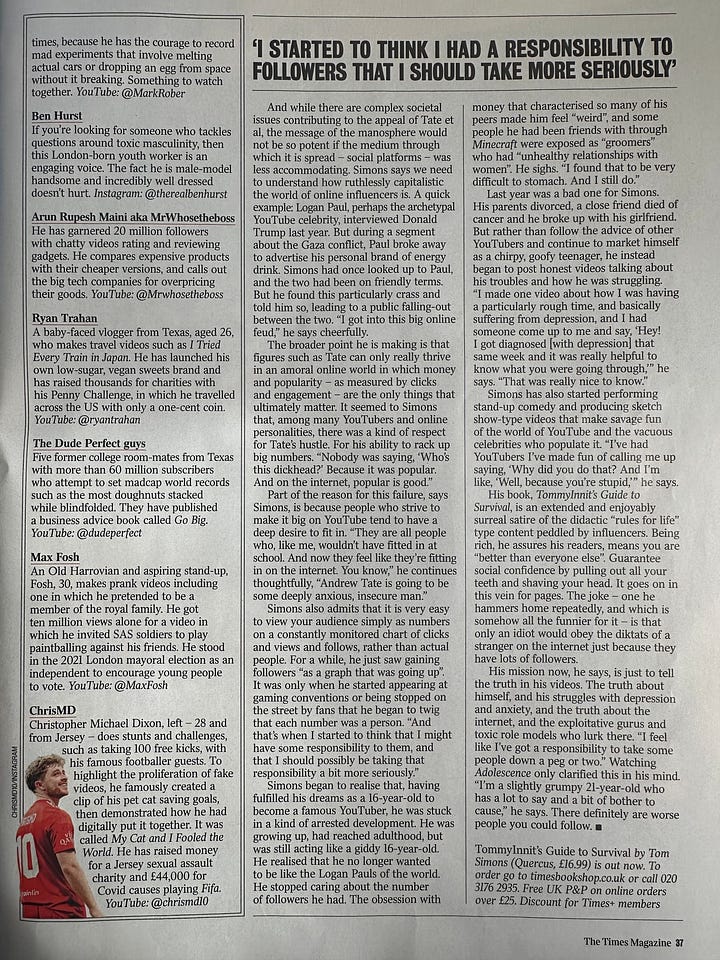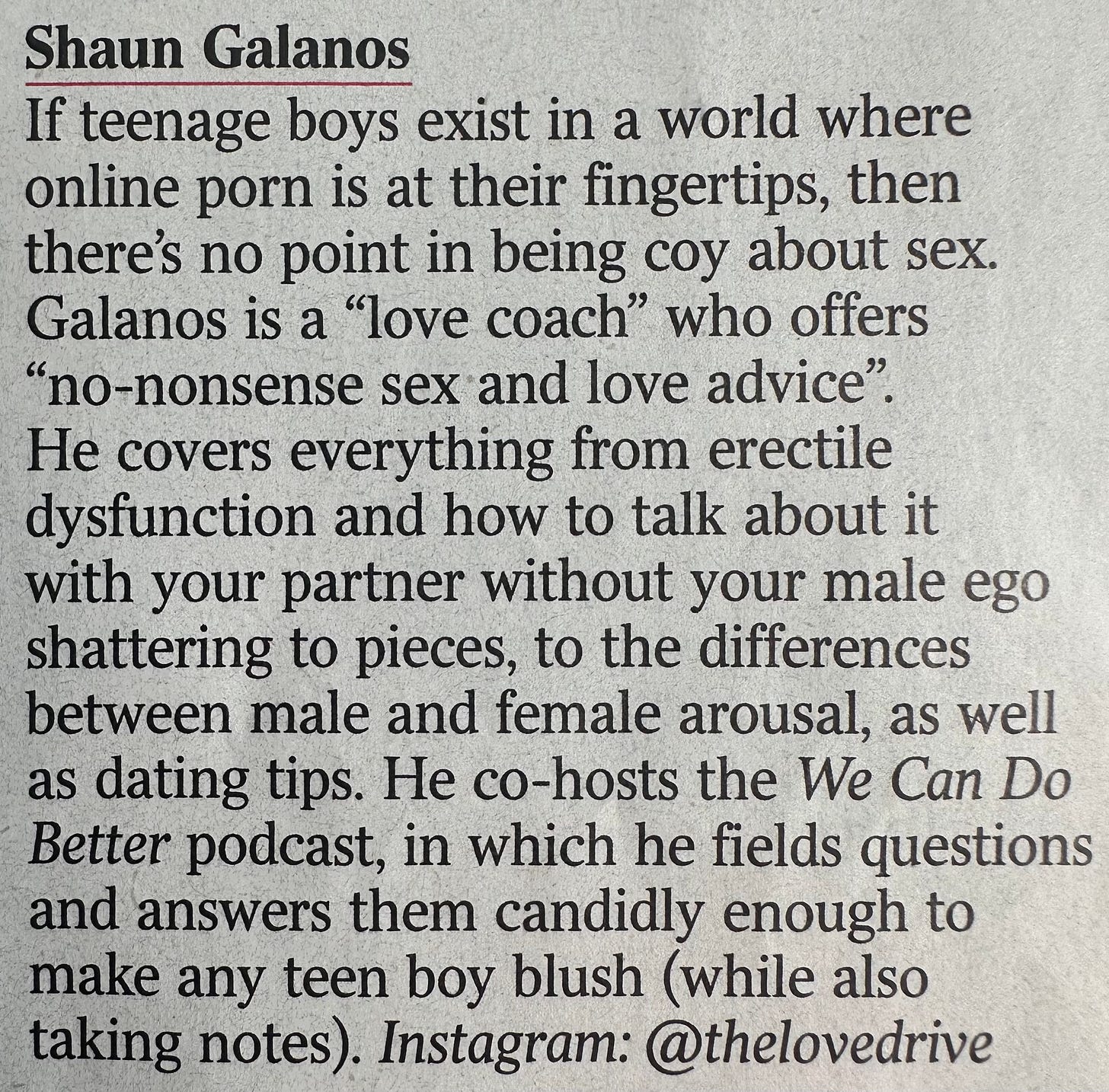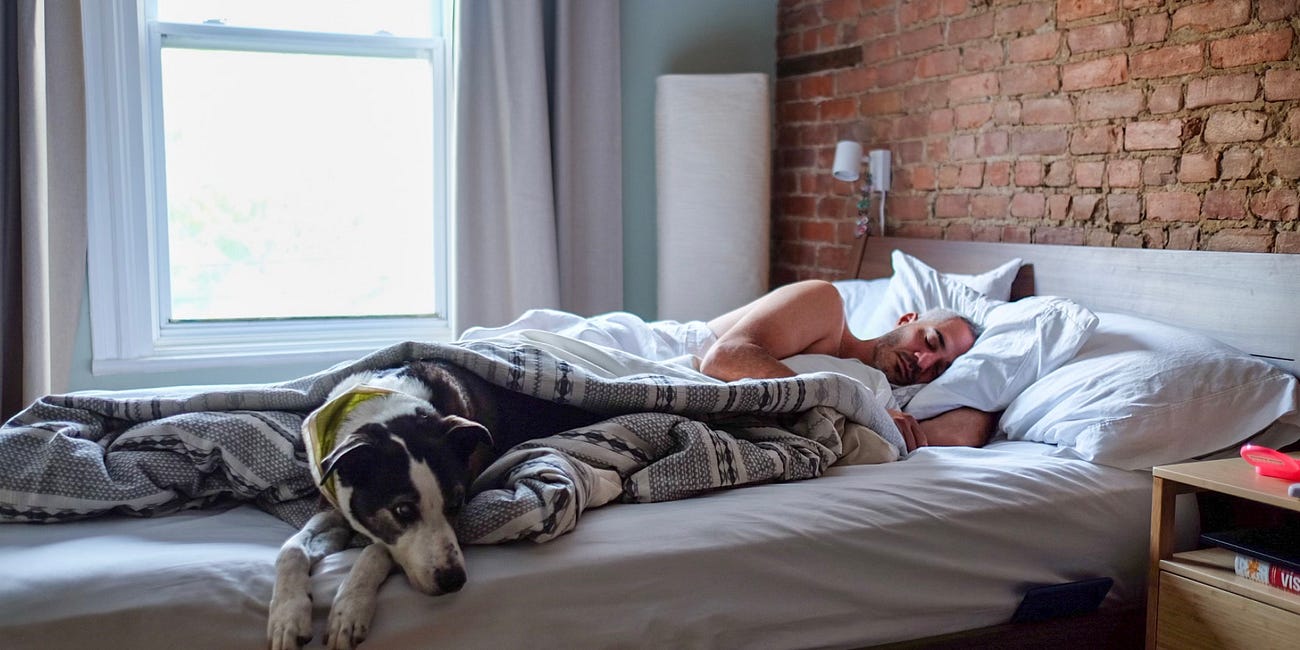What makes a good man
A conversation about evolving masculinity, emotional courage, and what it means to be a good man today.
Last week, I found myself on a list I never expected: The Anti-Andrew Tate List—a roundup of 14 non-toxic male role models published in The Times.
My name was there.
No one told me. No one from The Times reached out. I just got a text from a friend in the UK.
"Hey, this you?!”
When my friend texted me about The Times list, I was confused. Part of me felt proud, but another part felt like an impostor. Who was I to be considered a 'non-toxic male role model'?
I've never set out to be an example of 'good masculinity,' I've just tried to be authentic about my struggles and growth as a human who happens to be a man.


This has led me to reflect on what being a 'good man' means i’ in 2025.
And how did I, someone who just started sharing honest thoughts about relationships a decade ago, end up representing this ideal?
I'm a good person, I think. I bring my shopping cart back after using it, pick up my dog's poop, let people in front of me in traffic (and give people a huge wave when I nose myself into their lane!)
But I rarely think of myself as a good man.
It got me thinking about masculinity, which I've been doing more lately.
We've been having this conversation collectively for quite some time, and I'm grateful for it.
#MeToo, the male loneliness epidemic, women leaving men behind financially, academically, and emotionally.
A reckoning is underway, and it's clear that we need better male role models.
I’ve never thought of myself as a male role model. Honestly, the idea is terrifying because talking to men opens me up to criticism in a way that talking to women doesn’t.
Ten years ago, I had zero audience. I started writing and creating videos about love, relationships, and dating on my personal Instagram account, which has 1,500 followers, mostly friends and acquaintances. I aimed to create content I cared about and share my voice, and I was happy to see who would respond to it.
And those who responded were overwhelmingly women. 85% of my audience is now women. The rest are queer folks and a tiny sliver of straight, cis-men.
I'm used to speaking, writing, and coaching about love to a mainly female audience, and I'm so grateful that most of the discourse on my social media has been largely free from hate, trolls, and mean comments.
Talking to men and about men opens me up to criticism that honestly feels uncomfortable, and as a sensitive dude, it is hard to deal with at times.
But here we are, and I'm curious how we can tweak masculinity to benefit us all.
What would that look like?
What could it feel like?
That's a huge question, and it's not easy to answer. Or maybe it is.
I want to share what I think could contribute to a healthier version of masculinity and examine which qualities I possess that help women feel safe. And, I'd also love to hear your ideas.
A note to men
I get it if you're a man reading this and feeling defensive. We've grown up with mixed messages about what makes a 'real man.' These suggestions might feel like criticism of who you are. But I'm not asking you to reject your identity, I’m inviting you to consider expanding it.
The qualities I'm describing don't replace traditional strengths like courage, determination, or protectiveness. They complement them. Adding emotional intelligence to your toolkit doesn't diminish your masculinity; it enriches it, making you more effective in every aspect of your life, including all your relationships.
And it can lead to a healthier, happier life.
According to the American Psychological Association, men who adhere rigidly to traditional masculine norms are less likely to seek help and more likely to experience depression, anxiety, and substance abuse issues.
The people in your life will notice. And not just your loved ones. Research from the Yale Center for Emotional Intelligence found that emotional intelligence was a stronger predictor of workplace success than IQ or technical skills, especially in leadership positions.
With research supporting the benefits of emotional intelligence and highlighting the costs of rigid masculinity, let's examine the practices that can help us evolve. These aren't radical new ideas; they're human qualities that have sometimes been discouraged in men, to everyone's detriment.
Practices for becoming a great man
Vulnerability is strength
Are you strong enough to be soft? Can you soften and share the less shiny parts with a few close people? You don't have to have everything under control, and it's OK for you to break down now and then. Show us when you're not doing well and why you're sad, and let us into your inner world.
Yes, some people will use your vulnerability against you. And they shouldn't. But some people can't help themselves. Your job will be to identify people who can tenderly hold you and your heart.
Last year was the worst year of my life. And instead of burying and bottling my feelings, I wrote about it all. The response from my audience was overwhelmingly positive, and a lot felt less alone in their grief. By sharing my vulnerability, I helped others feel seen. And that’s the power of opening up.
The worst year of my life
The year that broke my heart and made me realize what was important in life.
Express love freely and often
Don't be stingy with your love. Say "I love you" to those you love, especially the men in your life. You can start with "love ya, bro," but nothing replaces a simple "I love you."
Other things you can say:
You mean a lot to me.
Your support has been invaluable lately. Thank you.
I love spending time with you.
I'm grateful you're in my life.
Choose curiosity when challenged
Easier said than done, but when someone is upset with you and lets you know, rather than getting defensive, try to remain\ curious.
"Can you tell me more?" is a great place to start.
Seek to understand how they feel rather than to be understood. There's time for you to explain yourself later, but for now, listen.
Act with integrity
Do what you say you're going to do. Own your shit and never lie, but be kind. Tell the truth even when it's inconvenient or you think it will hurt the other person. People feel safer when they know where you stand.
Apologize when you've hurt someone, and vow not to repeat the hurtful behavior. Apologizing costs you nothing but a bit of ego, and we all have some to spare.
Respect boundaries
Honor consent. Don't push, manipulate, or cheat to get your way.
Respecting others’ ‘no’ makes your ‘yes’ more trustworthy. It fosters safety, and safety in turn fosters trust.
When someone says no to a request, always reply with,
Thank you for letting me know.
Protect without control
Protect others not to dominate or control, but to support and defend their dignity, dreams, and well-being.
Take care of marginalized groups and populations. Give freely when you can, and support those around you.
Validate before solving
Similarly, if someone confides in you or brings something heavy or challenging, try validating their experience rather than jumping to solve their problems.
"That sounds so hard/sad/challenging/upsetting" is a powerful statement and likely to be received better than you jumping in with solutions.
If you don't feel like taking a risk, you can always hit 'em with a
How did that make you feel?
Validate first, fix later.
Build brotherhood
Build relationships with other men based on truth, not posturing. Find ways to soften in your male friendships and share what's happening in your life. Ask questions that aren't centered on work, sports, or finances.
"What have you been struggling with lately?" might be a good opener.
Something that I usually do is share first. Be the one to break the ice about struggles, fears, or uncertainties. Your vulnerability creates permission for others.
And normalize physical affection. A real hug (not the half-hug with three back pats) communicates care that words sometimes can't.
Isn't there so much missing here?
Of course, there’s so much more to say. But this is a start.
And this is a list of qualities that all humans should strive to possess, regardless of gender. We've been socialized to believe that certain attributes are inherent in women and others in men, and we reinforce those beliefs from a young age.
We judge children using different standards, have them play with different toys, and instruct them on how to behave differently.
We tell boys to suck it up when they're sad and toughen up when they're soft.
And we wonder why some men struggle to express sadness and vulnerability.
Imagine a world where men feel free to access their full emotional range, vulnerability is recognized as a sign of courage, and expressing love comes as naturally as expressing anger. This isn't just better for men; it has the power to transform every relationship, workplace, and community.
We're on the right path.
Small, daily choices to listen more deeply, speak more honestly, and connect more authentically. Each time you choose vulnerability over posturing or curiosity over defensiveness, you're helping redefine what masculinity can be.
I never set out to be on any list of 'good men.' I've just tried to show up authentically. The greatest compliment isn't being recognized in The Times; it's hearing that something I shared helped someone connect more deeply with themselves or someone they love.
So, what's one small step you might take this week toward a more authentic version of masculinity? The comment section is open, and I read every response.
And if this resonates with you, share it with another man in your life. The conversation about masculinity doesn't change unless we're brave enough to start it in our circles.
My most popular reads
If you want to dive in, here are some of last year's top posts. Enjoy.
Ten things I look for in a partner
People often ask me what I look for in a partner, so I put this list together in no particular order.
I'm done looking for love
I've been looking for as long as I can remember. I'm a little love fiend, so the idea that I would give up is laughable. But that's where I'm at these days. I'm also coming to terms with the fact that I may never have kids and that I might be a solo polyamorist. Read on to learn more.










I am very pleased to be among the "tiny sliver" of straight men who follow Sean (#sliver) I grew up in a household of all women (sisters, mothers, grandmothers) and that brought struggles with masculinity. In the end, I decided I wanted to be good, kind, compassionate, romantic, passionate, and perhaps striving to do each of those well I will stumble upon being a man. Great read, and insights, and topic. (Can we get shirts for the sliver's?)
I completely agree with The Times. You are no “ imposter “ , Shaun. You are open and and real and people feel safe telling you things, because you engender trust. Combined with you being such a dude , and “ manly” - well , if that’s not “ masculinity” , I don't know what is. You also continue to help me get in touch with my own masculinity at this late date , and for that , I thank you.